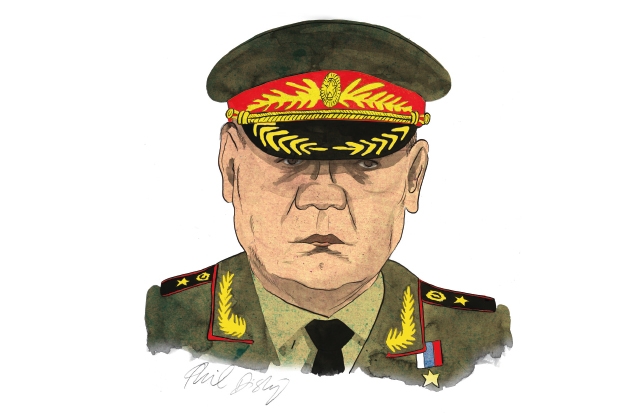‘Crimea is ours,’ President Putin boasted last May. He was speaking on a documentary viewed by millions of Russians, and it was the culminating moment in the militarisation of Russia. Moscow had attracted criticism for spending unprecedented sums on its armed forces under Putin, despite a weak economy over-dependent on oil. The successful annexation of Crimea seemed a perfect vindication.
Yet the huge expansion of Russia’s armed forces budget was instigated not by Putin but by the defence minister, the mysterious Sergey Shoigu.
The ascendancy of the military has propelled Shoigu up the ranks of the power elite to the extent that he is now regarded as the favourite to succeed Putin. And he has become a pivotal global figure after Turkey’s shooting down of a Russian warplane last week, which the Kremlin described as ‘planned provocation’. Shoigu is overseeing the investigation into the communications box of the aircraft, which will reveal if any warnings were delivered by the Turks in advance. And it was Shoigu who authorised Russia’s response: the deployment of S-400 missiles to the Russian air base in Latakia on the Syrian coast. As tension escalates, and Cameron and Obama dither, Shoigu has emerged as a key decision-maker.
He prefers to operate in the shadows, one step behind Putin and looking over his shoulder. His style is decisive but low-key. There have been no self-promoting TV interviews. Instead he prefers his spokes-man Igor Konashenkov to defend Russia’s Syria policy. When asked about the true targets of the air strikes, Konashenkov replied rather unconvincingly that the decision to bomb Syria was made at the last minute and executed within hours of the Russian parliament approving the use of force. In fact, Shoigu had been planning the military operation over several months.
As the brutal Russian pounding of rebel position in Syria intensifies, Shoigu remains a hardliner in Putin’s inner circle.








Comments
Join the debate for just £1 a month
Be part of the conversation with other Spectator readers by getting your first three months for £3.
UNLOCK ACCESS Just £1 a monthAlready a subscriber? Log in